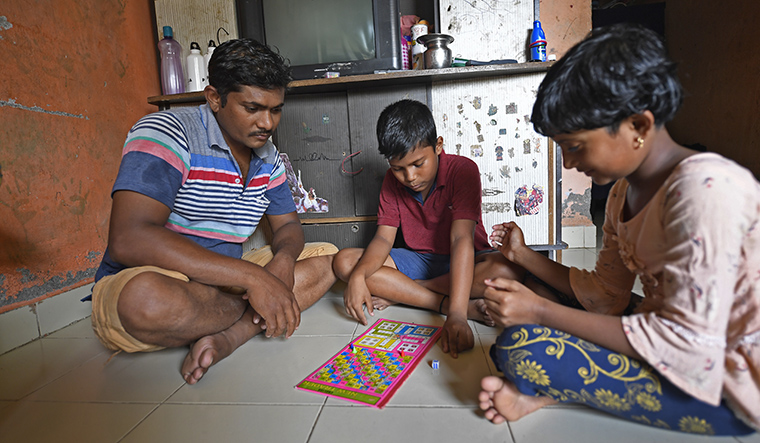On the evening of March 15, Wahid Shaikh was at the entrance of the Welcome Ground in Film City. He was waiting for his turn to do a shot for the Ananya Pandey-Ishaan Khatter starrer Khaali Peeli, along with other junior artistes. Choreographer duo Bosco-Caesar were prepping the 200-odd artistes for a song with a mela as the backdrop. Then a call came. Amid the growing spread of Covid-19, the entertainment governing bodies had called for shoots for all mediums—cinema, television and web—to be stopped.
Ever since he dropped out of school 18 years ago, Shaikh has been working as a junior artiste. For an eight-hour shift, he makes Rs1,050 when shooting for a television or web series and Rs2,100 for a film. He is currently president of the Junior Artistes Association.
Talking on the phone from his Mira Road home, where he lives with his wife and seven-year-old daughter, Shaikh says panic struck on the set of Khaali Peeli on March 15. “What would happen to us and our families if no shoots happen?” people were asking. March had not been kind for many of the workers; assignments were hard to come by as producers were postponing shoots. According to Shaikh, many junior artistes had been finding it difficult to get work even before. And now, their savings are drying up.
Sachin Kumhar, who worked as a spot boy (helper on the set) for almost 12 years, is also worried. In February, he worked on Ranveer Singh’s Jayeshbhai Jordaar with Yash Raj Films, earning Rs1,127 a day. He made enough to sail through a month. He had missed the outdoor schedule of the production house’s next film, Bunty Aur Babli 2, but was hoping to be in its Mumbai schedule. It was then the shoots were halted.
He supports a family of six. The savings can see them through a fortnight, but he predicts it will be difficult after that. On other occasions, when Kumhar does not get regular work, he offers his services at editorial shoots or with fashion photographers or for advertisements, sometimes for theatre, too. But right now, it is a stressful situation for him.
The work has stopped in an unprecedented way, says Rajan Shahi, founder of Director’s Kut Productions that makes TV shows like Yeh Rishta Kya Kehlata Hai, which has been running for 11 years. Shahi’s new show Anupamaa was also scheduled to air on Star Plus from March 16 in the prime 9pm slot. “But after conversations with the channel, it was decided to launch it only after the situation improves,” says Shahi.
Since the outbreak of the virus started making news, channels sent out strict instructions that the health of members on the sets should not be compromised. Doctors were deployed, hand sanitisers were placed in and around the sets and everyone was vigilant. Shahi says that people who have been associated with them for long are now being helped, financially or otherwise.
“Everyone is stressed,” says Pankaj Singhania, an artiste coordinator with Ravindra Suri & Company. “We have around 1,900 artistes enrolled with us and we look for as many opportunities as possible for them,” he says. But even on a regular day, it is not easy to find employment for everyone. The demand for artistes is much less than the supply.
Singhania, who has been in the industry for more than 25 years, says even occasional worker strikes have never dented the daily earnings of people as much as he suspects this shutdown period would. “Some of these artistes don’t have enough money to sustain themselves if they don’t get work for more than three or four days,” he says.
A distribution drive of rations to the 4,000 most needy from the artistes’ fraternity was planned on March 22. But with the Janata Curfew and now the nationwide lockdown, the packets are still with the Federation of Western India Cine Employees (FWICE). “We are trying to figure out ways to hand over the packets, but it has been difficult,” says Ashok Dubey, general secretary, FWICE. Moreover, the Producer’s Guild is crowdfunding to help the daily-wage workers in the industry, and Salman Khan has pledged to financially support 25,000 of them through his charity, Being Human Foundation.
Despite these efforts, the situation is grimmer than it looks. It could still spiral out of control and affect more people than one can imagine in an industry that mostly works with contractual employees at almost every level.
Tarannum Khan, a make-up artist, who also works on a contractual basis, was in Punjab with the team of Aamir Khan’s next film, Lal Singh Chaddha, for over two months. “Because of Covid-19, the Delhi schedule of the film, which was to follow, was cancelled,” she says. Tarannum admits that she can sail through the next few months with her savings, but what worries her is the plight of those like the dress man or the light man who were earning meagre amounts, working individually and do not have any assistance or parent company to look to in this time of need.
Most of those who could move before the complete lockdown have gone back to their hometowns. “There was nothing to do in Mumbai,” says Sonu Shrivastava, a coordinator of background dancers in films, who returned to Bhopal. He emphasises on the high cost of living in Mumbai. “What was the point of staying there? I told everyone to head back home as soon as possible. At least you will be with your family.”
Nobody knows if everything will return to normal. The shoot of Karan Johar’s Takht was scheduled to kick off on April 24, but has now been delayed indefinitely. A lot of junior artistes were hoping to get work in this big-budget drama. If the lull continues for long, more films and TV shows could be delayed or shelved for fear of becoming dated and irrelevant. And that is not good news for anyone in the industry.


